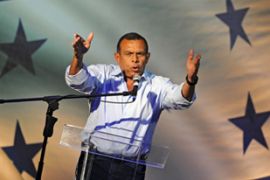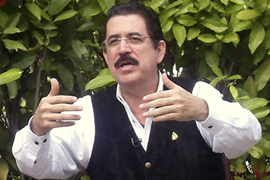Honduran president ‘fears new coup’
Coup talk rattles Central American nation one year after Zelaya was ousted as president.

However, Juan Barahona, the leader of the anti-coup movement that staged months of protests last year, dismisses Lobo’s conspiracy talk as a media ploy to gain sympathy and create a false impression of independence from the business community.
“This regime is controlled by business. It’s a continuation of the coup,” Barahona said.
Unsolved killings
A string of assassinations have remain unresolved since the coup, including that of nine journalists, both supporters and opponents of the government.
Motives can be hard to determine in a country plagued both by political tensions and brutal drug gangs whose hired assassins roam the streets on motorcycles.
The violence, and Lobo’s allegations of a coup conspiracy, threaten to undermine Honduras’ reputation as a thriving democracy.
 |
| Zelaya was ousted from office when he began to move closer to Venezuela’s Chavez [AFP] |
They also hurt any chance for the Organisation of American States, which suspended the Central American country after the June 28, 2009, coup, to welcome them back.
Zelaya, who, like Lobo, comes from the ranks of the landed rich, angered the business elite in early 2009 with a campaign to rewrite the constitution, promising the poor they would get a voice in shaping the future of the country.
When Zelaya ignored a supreme court order to cancel a referendum on the grandiose plan, soldiers flew him into exile in his pajamas at gunpoint.
A year later, Lobo, who was elected in November and took over from the coup-installed interim government in January, finds himself grappling with the same tensions between rich and poor.
Under pressure
Eight months into his presidency, Lobo is under pressure from the US to promote reconciliation and under fire from business leaders and politicians for even referring to Zelaya’s removal as a “coup”.
The country’s conservatives, who say he was legally removed from office through a congressional vote, are also upset with Lobo for announcing that he would not oppose another attempt at an assembly to rewrite the constitution.
| in depth | |||||||||||||
|
Tensions rose when Lobo struck a deal in April with farm workers who occupied thousands of acres of palm oil plantations in the fertile Aguan valley.
Lobo offered to have the government buy part of the occupied land and turn it over to the squatters to prevent more violence, but when the owner demanded too high a price, Lobo’s agriculture minister threatened expropriation.
Officials allege that during the months following the land deal, members of Lobo’s own conservative National Party held at least three meetings at private homes in Tegucigalpa, the capital, to discuss “radical action” against the president.
“When members of the political sector and businessmen with economic means start talking like that, you have to take pertinent measures,” Alvarez, the security minister, said.
However, the government has not taken action beyond Lobo’s public warning.
The political intrigue echoes last year’s coup: Zelaya’s own centrist Liberal Party and the business community turned against him when he started reaching out to Hugo Chavez, the Venezuelan president.
